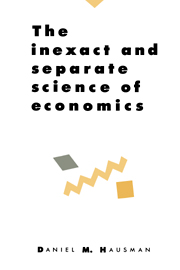Book contents
- Frontmatter
- Contents
- List of figures
- Dedication
- Introduction
- Part I Introduction, structure, and strategy
- Part II Theory assessment
- 8 Inexactness in economic theory
- 9 Methodological revolution
- 10 Karl Popper and falsificationism in economics
- 11 Imre Lakatos and economic methodology
- 12 Economics as an inexact and separate science
- 13 On dogmatism in economics: the case of preference reversals
- Part III Conclusion
- Appendix: An introduction to philosophy of science
- Bibliography
- Index
10 - Karl Popper and falsificationism in economics
Published online by Cambridge University Press: 04 August 2010
- Frontmatter
- Contents
- List of figures
- Dedication
- Introduction
- Part I Introduction, structure, and strategy
- Part II Theory assessment
- 8 Inexactness in economic theory
- 9 Methodological revolution
- 10 Karl Popper and falsificationism in economics
- 11 Imre Lakatos and economic methodology
- 12 Economics as an inexact and separate science
- 13 On dogmatism in economics: the case of preference reversals
- Part III Conclusion
- Appendix: An introduction to philosophy of science
- Bibliography
- Index
Summary
In chapter 9 we criticized contemporary alternatives to traditional views of theory appraisal in economics. But we need to look deeper to the philosophical underpinnings of this reaction. The philosopher who has had the greatest influence is Karl Popper (Mäki 1990b). He is often invoked by Mark Blaug, Terence Hutchison, and lesser writers on economic methodology. His philosophy even influenced a major introductory textbook, Richard Lipsey's An Introduction to Positive Economics (1966). If Popper is right about what scientific methodology requires, then the traditional Millian view of justification in economics developed above in chapter 8 is indefensible.
This chapter presents and answers the Popperian challenge to Mill's views by criticizing Popper's philosophy of science. These criticisms of Popper's views are widely accepted among philosophers. Although I share Popper's concern that scientific theories be testable, Popper's philosophy prevents one from coming to terms with the problems of testing in economics. A reasoned concern with testability leads one, I shall argue, to reject Popper's philosophy of science and to reconsider the Robbins-Mill view of theory appraisal in economics.
The problems of demarcation
Throughout his work Popper has been concerned with what he calls “the problem of demarcation,” the problem of distinguishing science from non-science (A.12). He is careful to stress that this is not the problem of distinguishing what is true from what is not, for science may lead us astray, and non-sciences or even pseudo-sciences may happen on the truth.
- Type
- Chapter
- Information
- The Inexact and Separate Science of Economics , pp. 172 - 191Publisher: Cambridge University PressPrint publication year: 1992



